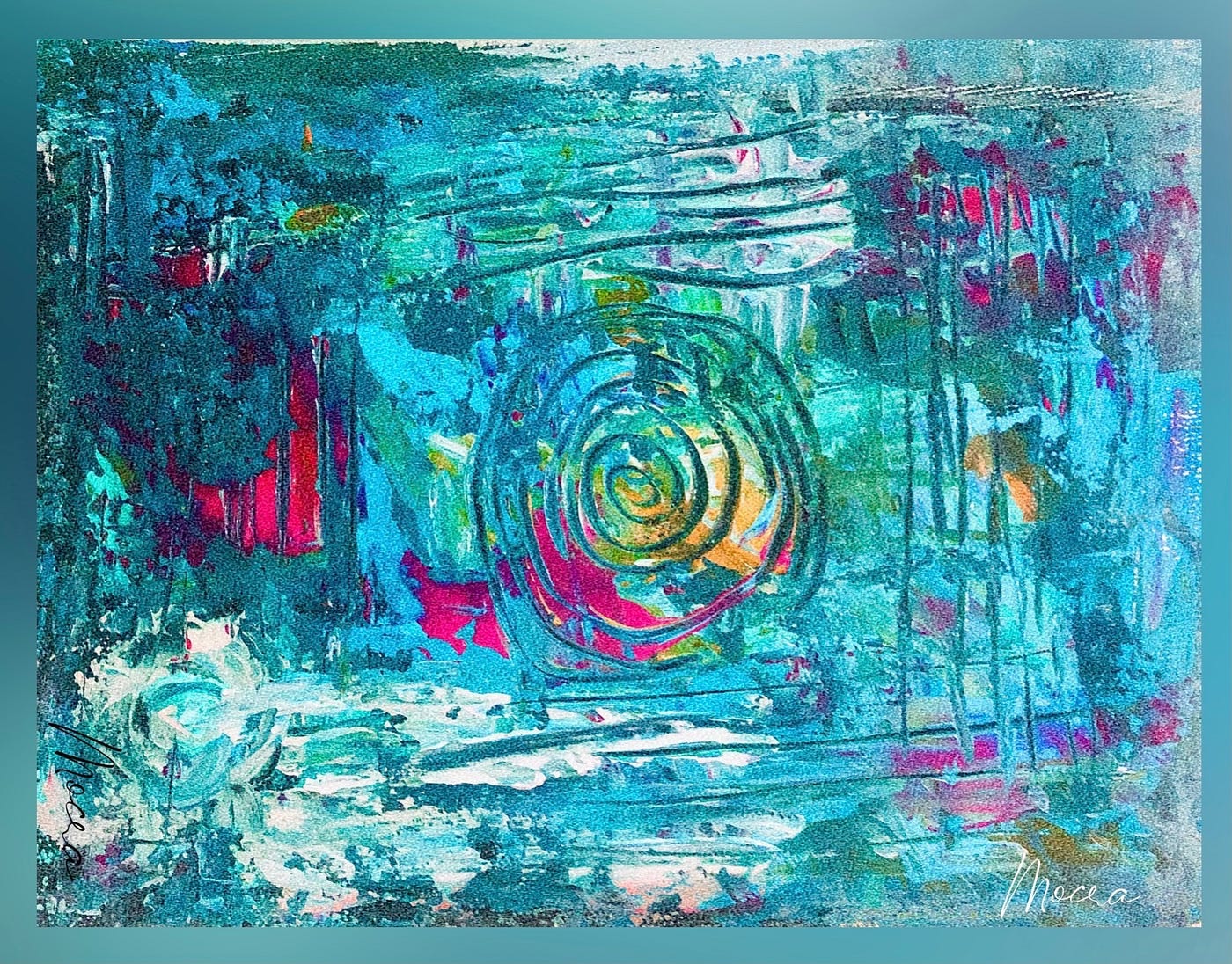Why (not) me?
Looking for meaning in our suffering
A few years ago, when my kids were toddler aged, we would go to pee-wee soccer games and parks on the weekends to keep them entertained. In those days, the word I heard most frequently on the playground from toddlers, apart from requests for food, was “why?”
I announce it’s time to go, and the kids ask “why?”
Because it’s nap time.
Why?
Because if you don’t take a nap you’ll be cranky.
Why?
Because you take after your father.
Why?
Those of you who have spent time with preschoolers know what I am talking about. This is a developmental stage where children learn to start voicing their curiosity. I don’t know if anyone has coined a term for it - but I like to call it “the ordering of the universe.” The tots are making meaning of things, like learning cause and effect. It’s the first sign of critical thinking. It’s a skill that we continue to use throughout the rest of our lives to develop a logical framework for understanding. We have an insatiable thirst for knowledge and explanation. It’s how we make sense of the world around us.
(Also, I think my kids knew that the why questioning drove me up the wall and so they asked it more! If you’re not familiar with this fun phase, watch the video below!)
It turns out that the playground is not so different from the hospital. Even after we grow up, we are still trying to order the universe.
As a chaplain, the question I hear most frequently in the hospital is “Why?” Usually in the context of “Why is this happening?” “Why do I have to go through this now?” “Why is God doing this to me?”
I have had countless patients tell me that if only they understood the reason for their suffering, then perhaps they would be able to cope with it a little better. The clinical term for this wondering is “existential meaning making.”
It is asking the larger question of why does suffering exist and more personally - why am I suffering in this way right now?
Why is the cancer spreading?
Why is my marriage not working?
Why can’t I find a job?
The Whys of our lives are endless.
When faced with this “why” question from patients, my students are often tempted to give an explanation. They might launch into a sermon on theodicy (the theology of suffering). This is when we run the risk of lobbing a religious platitude. Much like Job’s well meaning friends, we want to offer some explanation that will help ease the pain. When faced with unbearable suffering, we might want to give comfort or hope, or somehow try to fix the situation.
Quite often, however, there is no worldly explanation. There is no making everything better. My students are dismayed when I tell them to answer these big “Why” questions with a simple “I don’t know.”
In the face of these cosmic queries, I encourage saying I don’t know or letting the question hang unanswered for a few reasons:
It’s true.
We really don’t know the answer. I’ll sometimes joke that I wish I knew the answer to this question. We can only ever speculate as to why something has happened in one way, but we don’t know the mind of God. We can only guess, because we only see through a mirror dimly now. Any answer we give is just speculative and might not be helpful.
Answering doesn’t solve anything.
Even if we could come up with a really good guess (just like Job’s friends), it doesn’t eliminate the pain and suffering. In some instances, it makes it worse. Job’s friends tried to convince him that he must have done something to deserve this - that it is somehow his fault. We do the same thing unwittingly, when we say things like “Everything happens for a reason” or “God is testing you right now.” We mean well, but it robs the person we’re caring for of the opportunity to grapple with the depths of the pain.
They aren’t looking for an answer.
People ask the question knowing it is irrational and has no answer, but in giving voice to it, they are starting to cope with the reality of their situation. Often the why question isn’t an actual inquiry hoping for data, but rather a means of lament. Especially if the person is mad at God or the universe in general – asking why can be an act of anger and/or distress. It is letting the divine know that you were not expecting this outcome and thus is a form of intrapsychic loss.
Many patients are articulating the hope for meaning in their illness. People say, “If I could only figure out the reason why this was happening, then I’d be ok with it.” They wonder: Is this a spiritual test? Is it some sort of punishment? Is it an opportunity for learning or growth? There is an invitation for a chaplain and/or spiritual director to delve into the nature of one’s belief about God more fully here, to tease out one’s personal theology - but that takes time and skill to do.
In a research study on existential suffering, one participant cried out,
"Why me... why now when I finally have my life together... why now when I've worked so hard to be a well person - where's the justice in this? Where's the fairness? I finally thought I had it figured out and then this..."
When suffering happens it causes our own internalized beliefs to come into sharp focus. For example, in the quote above - if we believe the world is fair and just, then our pain does not make logical sense. But then again, life tends not to be that rational. Suffering definitely is not logical.
I certainly understand wanting a framework and asking why. I’ve asked that question plenty of times myself. But (and I would never tell my patients this) I’m not convinced that the answers would help the bearing of the suffering. I think that might be a fantasy we have for ourselves.
The why is our way of trying to make sense of a senseless world, construct meaning and find a way forward, to regain our footing when the rug has been pulled out underneath us. Another participant phrased this core-shaking uprootedness thusly,
"A crack appears in our carefully crafted concept of reality... The very nature of reality is experienced in a new way. We are sucked into the startling realization that the rules of the game are not what we had imagined."
This piercing of the veil is sometimes more about the expression of grief than looking for a concrete solution. It changes our whole notion of how we thought the world should be.
We think of the answer to our whys as a roadmap for coping. That is not always the case – and certainly cannot be done immediately after an intense situation.
I don’t often see how patients’ journey of meaning making evolves from their current crisis because those understandings take a lot of time and I am with them for only a short while. It often takes us years to look back on an event in our lives and ascribe some divine meaning to it.
Except once.
I met a patient who was convinced immediately of his “why.”
Along Came a Spider
Vern was a big, burly guy admitted to the hospital with a severe allergic reaction to a spider bite. I was confused as to why his chart listed his admitting diagnosis of “spider bite” and yet he was placed in the oncology unit.
He shared enthusiastically that he was “just so grateful for this little spider.” With tears in his eyes, he said “I think I’m even going to get my next tattoo of a spider to commemorate him.”
When I probed deeper about the reasons for his appreciation for his arachnid buddy, I learned that the treatment of his allergic reaction to the spider bite led to tests that showed he had cancer. “Which I never would have known about were it not for the spider bite.”
Vern believed God sent the spider as a messenger to let him know about his cancer, so that it could be caught early and treated. His meaning-making attributed divine intervention to his cancer diagnosis, which helped him to focus on gratitude.
Gratitude in stressful circumstances can help foster resilience. This mindset changed Vern’s whole perspective and he gave him a sense of order and hope. Others in his situation may have had a different and entirely understandable framework response such as “First a spider bit me, now I have cancer, woe is me, what is next?” Vern’s meaning-making embraced his optimism and positive view of God’s role in his life.
Another antidote I often hear expressed to the “why me” question is when patients say, “why not me?”
Some patients do not express surprise at the negative events unfolding in their lives, but rather, expect them. I find this especially true for people who have sustained previous traumas in their life. They are not shocked by the events, because their life-shattering experiences have already occurred. They anticipate hardship.
When I spoke to one woman who had a recent cancer diagnosis and asked how she was doing with the news, she replied “Oh honey, this is nothing. I’ve lost my husband, I’ve lost my son, God got me through those things. A little cancer is the least of it. And if this is my time, so be it, I’ve had a good life.”
So much of whether we ask why me or why not me depends on our beliefs and the meaning we make of our suffering.
I recently came across the poem below. I would definitely not share it with a patient who is asking why in the midst of their suffering. But I think it is one way to summarize the difference between these perspectives. And how we get consumed with meaning making and lament in the throes of our deep pain (which again, is an appropriate response) but may not think about it in ordinary times.











I love this topic, Christine! Really helpful to keep on-hand for the suffering around us and within us. Truly. Only a chaplain, and particularly you with your spiritual director training as well, can offer such a tender treatment of this topic.
I think additionally something I've had to work on is my capacity to hold the 'Why" and the "I don't know?" As a physical therapist, people often come because they are in pain that they don't understand. As you know, I tend towards a chaplain-archetype. In such a profession, we are supposed to have the answers so that the patient can be 'fixed.' But often the reason that body challenges show up is more complicated than than, more than just a mechanical issue (because the human machine metaphor breaks down), and includes emotional components (because research is showing us that persistent pain is, at a minimum, physical + emotional + social). So teaching my nervous system to have the capacity to hold the "I don't know," continues to be an important part of being a healthcare provider for me.
I loved this post and it has certainly explained my journey for meaning-making in my husband’s cancer diagnosis- my life’s premier earth-shattering event. I asked myself why, lamented my sadness and depression, questioned my beliefs and worldly construct…only to arrive at the simple conclusion that life isn’t rational and one needs to take a day at a time. Thank you for this post - it helped me understand a new piece of my journey.